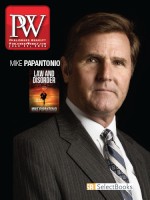You’ll Miss Me When I’m Gone, the new thriller by New York Times–bestselling author Kevin O’Brien, is a page-turner wrapped around one of today’s pressing issues: school bullying. O’Brien has written his way into this kind of territory before, but now he goes deeper and darker than ever.
Playwright Luke Shuler and Andrea Boyle are a couple trying to start a new life together. Andrea has just moved to Seattle with her orphaned nephew, Spencer; Luke has a troubled son named Damon and a soon-to-be-ex-wife who is inappropriately obsessive about Luke, their son, and, increasingly, Andrea. When Luke and Andrea decide to move in together, kids in tow, things get unexpectedly complicated. Damon is bullied at school, with Spencer as witness, and in the aftermath of a bullied teen’s suicide, some of the bullies start to die.
Few successful novelists begin their careers as railroad inspectors, but O’Brien did, and he explains how it worked to his benefit. After college, he took what he expected to be a temporary job inspecting railroad facilities. “There was a ton of alone time, which an author needs,” O’Brien recalls. “Most of my first novel, Actors, was written in Best Westerns and Red Lions. In college, I wrote some short stories and I made myself a promise: if I didn’t sell any writing by the time I was 30, I’d give up.”
He found an agent, but after dozens of rejections, his 30th birthday arrived, and O’Brien remembers it as “a letdown.” He adds: “The very next morning, the phone rang at 6 a.m. It was my agent, singing happy birthday and announcing that I’d sold my book.”
O’Brien still had to keep his railroad job for a while longer, until his second book, Only Son, sold to Kensington. After Kensington acquired the rights to publish Only Son in the U.S. and Canada, O’Brien and his agent went on to sell the film rights, as well as book club rights to Reader’s Digest. With all that and a buyout from his railroad job, O’Brien had enough to live on for almost two years, allowing him to become a full-time writer. PW talked with O’Brien about his career, past and present, and what experienced writers can teach new ones.
Why did you choose to write about school bullying?
I was bullied during high school. One particular kid targeted me. I patterned one of the bully characters after him: a wimpy smart-ass who is popular with the jocks and the in crowd. I probably could have beaten up this kid, but I felt so scared and paralyzed around him. It’s weird how I let myself become a victim—and the shame I experienced for that. It got so I dreaded going to school and once there, I tried to stay invisible. But then, my nemesis suddenly transferred to another high school. Sadly, there have been so many stories recently about bullied teens committing suicide. I can’t help thinking, that could have been me. When an author thinks about a topic that way, it makes writing about that issue very compelling—almost necessary.
Is there anything that can be done to combat bullying?
There’s a stigma attached to being bullied. I felt shame. I didn’t want anyone to know I was being bullied, because then I’d have to acknowledge why I was being bullied. I was pretty effeminate, and didn’t want to be perceived that way. If we can remove the stigma that comes from being bullied, victims might feel more free to talk about it and get help.
I gather you have an interesting, intense writing process.
There’s not a lot of downtime between books. I usually give myself a few days to recuperate after delivering a book, but then within a week, I start jotting down ideas for the next thriller. After 20 years and 16 books, my editor, John Scognamiglio of Kensington, and I work well together. John sometimes suggests an idea. We’ll toss plot angles back and forth. If I get enthusiastic about it, I’ll start working on the outline. My outlines are basically mininovels—with description, action, dialogue, and punchy walk-offs, always around 80–100 pages. I’m always slow getting started and write mostly at night, every night, even if it’s just for an hour or two. It’s a routine I developed when I was working at the railroads. But about a third of the way into the outline, something kicks in and suddenly I’m writing day and night.
Any advice for aspiring authors?
Listen to established authors. Go to local book signings and ask questions. Get their advice. Take notes. We authors love to talk about what it was like getting started.



 Volume 263
Issue 28
07/11/2016
Volume 263
Issue 28
07/11/2016





